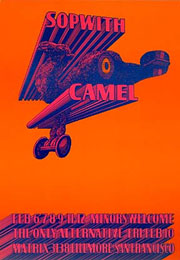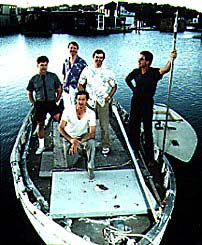|
Large crowds filled the club grounds on both days -- nearly 2,000 on Saturday and many more on Sunday. Saturday's bill featured Big Brother and the Holding Co., The Youngbloods, Vince Guaraldi Trio, The Sopwith Camel, The Cycle, and Tom and Lee; and on Sunday two jazz groups, the Chris Ibanez Trio and The George Duke Trio, were added to the line-up. The audiences on both days were equally responsive to all entertainers. The enthusiasm was so great on Sunday that the crowd stayed til after dark, even though they were unable to see the group that was playing -- The Sopwith Camel. The Camel solved the darkness problem, however, by turning the lights of their ambulance on and directing them at the stage.
|
For San Francisco's psychedelic Sopwith Camel, life as a sixties pop sensation ended as quickly as it began. In February of 1967, the band scored its one and only hit, a good-time novelty tune called, "Hello, Hello." Within six months -- immediately following the release of its debut album -- the band was defunct and slipping from public consciousness, so much so that the album carried a sticker reminding buyers, REMEMBER HELLO, HELLO! It all began in late 1965. Peter Kraemer, the group's vocalist and lyricist, had dreamed up the name for the band while living in Haight-Ashbury at 1090 Page Street, the infamous twenty-five room Victorian house with the basement ballroom where Big Brother and the Holding Company rehearsed and performed. During the flowering of San Francisco's counterculture, everybody wanted to be in a band, and Kraemer was no exception. He ran into guitarist Terry MacNeil at a bookstore, and within a week they had written eight songs, including "Hello, Hello." After they added guitarist William Sievers, drummer Norman Mayell and bassist Martin Beard, they began performing at the Matrix, one of the first clubs to present psychedelic music. Their
big
break
came
when
Eric
Jacobsen,
the
twenty-six
year-old
producer
who
had
produced
seven
Top
Ten
hits
for
the
Lovin'
Spoonful,
came
out
to
San
Francisco
scouting
talent.
He
heard
"Hello,
Hello,"
loved
it
and
turned
it
into
the
first
national
hit
for
a
genuine
hippie
band.
But
success
didn't
stop
the
band
members
from
bickering
offstage,
and
the
Camel
soon
disbanded.
Sievers,
who
quite
to
pursue
a
brief,
ill-fated
solo
career,
chalks
it
up
to
immaturity.
"We
were
not
the
kind
of
seasoned
musicians
and
performers
that
it
would
have
taken
to
maintain
on
that
level,"
he
says.
"We
fell
prey
to
the
various
temptations
of
the
Sixties.
We
did
it
big
fast
but
didn't
get
a
lot
In 1970, Kraemer and MacNeil started writing songs together, eventually deciding to re-form the band. Their 1973 comeback album, The Miraculous Hump Returns from the Moon, stiffed, and their tour literally went up in smoke when the truck loaded with their equipment caught fire. Beard and Mayell went on to play sessions for Jacobsen in the late Sixties and early Seventies, appearing on Norman Greenbaum's hit album "Spirit in the Sky." Mayell later joined a version of Blue Cheer. Today Beard, 40, is an electronic technician for a Silicon Valley company, and Mayell, 45, owns a successful typesetting company with his wife, Judy. Sievers, 44, markets condominiums for San Francisco's Pacific Union Company. Kraemer, 43, lives on a converted ferry boat in Sausalito, California with his kids, Michael, 16, and Zolee, 14. His post-Camel gigs have included ditch digging, carpentry, house painting, landscaping and night club management. He also paints on canvas, and some of his art was shown at a San Francisco cafe last year. Terry MacNeil became a follower of Gurudeva Sivayasubramuniyaswami in the late Sixties and changed his name to Nandi Devam ("Every band had to have one of those," says Mayell, laughing). Devam, 43, lives with his wife, Surina, and their three daughters. He's suitably philosophic about the wheel of fortune: "As far as I'm concerned, everything is perfect the way it happens. It always happens for a reason." Kraemer has a different perspective. Standing on a short wooden bridge that leads to the ferry, he says with a laugh, "If I had only hit the big time, I could have a condo on the hill and a Porsche and cocaine and a limitless stream of blondes." |
Gene Sculatti Joel Selvin Rolling Stone Magazine David Biasotti Andrew Lau

